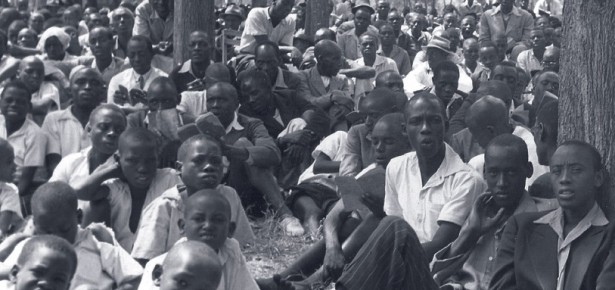
I am very pleased and honored by the awards that Ethnic Patriotism and the East African Revival has received. And I am particularly pleased that the book was published by Cambridge University Press, for Cambridge played a formative role in the book’s subject matter, in the research that upholds it, and in its writing. The book’s subject is the East African Revival, a Christian conversion movement that began in southern Uganda in the 1930s and spread through much of eastern Africa in the 1940s and 50s. The Revival’s infrastructure was upheld, in part, by graduates of Cambridge University, and in the 1940s and 50s an evangelical student group met in a church hall in downtown Cambridge to read literature and discuss happenings in Rwanda and Uganda. Seventy years later, I composed the book’s core chapters while teaching in the History Faculty at Cambridge University. I drew extensively from archival materials that earlier generations of Cambridge evangelicals had left in the university’s libraries.
Since its foundation in the 1960s, African history has acquired its own academic journals, its own textbooks, its own librarians, its own labels in the Library of Congress classification system.
The university’s press has had a formative role in the definition of the field of African Studies, and it is worth reflecting on that legacy now. The earliest books in the Cambridge African Studies series are the fruit of the emergent field of sociology. Sociology had found its footing in Africa in the wake of the Second World War, as colonial governments reckoned with rapid urbanization and the growth of working classes. In the 1950s and early 1960s a number of colonial governments had sociologists on the official payroll: Hans Cory and Henry Fosbrooke in Tanganyika; Philip Mayer in Kenya; D.P. Gamble in Nigeria. The authors who published on the Cambridge series carried this tradition forward. They were keenly interested in distancing their new field from the older traditions of ethnographic writing. The city, not the tribe, was their research site; the worker, not the rural man, was their subject; economics, not culture or kinship, was their primary concern. The first book on the series was published in 1970 under the title City Politics. It concerned Léopoldville in the early 1960s, and was based on a survey of households in two of the city’s thirteen communes. It was soon followed by works on Ghanaian factory workers, on gold miners in South Africa, on elites in Lagos, and on railwaymen in eastern Africa and in Ghana. From its foundation, the Cambridge series was conceived as a forum where new economic and social formations could be inventoried, studied, and assessed. This was a practical scholarship, a scholarship meant for its times. Like the government sociologists of an earlier time, Cambridge authors viewed development both as a managerial responsibility for government and as an index of social and political modernization. The series published scholarship that was appropriate to the development era: it harnessed expert knowledge to address the problems that governments confronted in managing their populations.
In the early years there was relatively little space for history. The first works of history published on the series were numbered 13 and 25: Ivor Wilks’ Asante in the Nineteenth Century and John Iliffe’s Modern History of Tanganyika. Both were works of tremendous erudition, based on an extensive, footnoted scholarly apparatus. These first historians of Africa were introducing themselves to a skeptical British academic establishment. In 1969, only a year before Cambridge had launched the African Studies series, the eminent Oxford don Hugh Trevor Roper had published an article calling Africa ‘unhistoric’ (he had earlier referred to African history as ‘the unrewarding gyrations of barbarous tribes in picturesque but irrelevant corners of the globe’). Wilks and Iliffe knew they had to prove the merits of the new field. Wilks’ index ran to fully 62 pages. Iliffe was equally thorough. He went through the whole of the Tanzania National Archives, virtually file by file, at the very time that the archive was being opened to public inspection. These were foundational works, produced out their authors’ profound sense of methodological and professional anxiety. Their erudite example helped to establish the series’ reputation. By my count the series has won five Herskovits Prizes from the African Studies Association.
To have Ethnic Patriotism and the East African Revival on the same series as Wilks and Iliffe is a great honor. I do, however, wonder at the costs entailed in my field’s encapsulation by geography. As David Cohen and others have commented, African history has enjoyed a ‘fast professionalization.’ There has been a serial dimension to the field’s growth, a rapid accrual of all the elements of scholarly respectability. Since its foundation in the 1960s, African history has acquired its own academic journals, its own textbooks, its own librarians, its own labels in the Library of Congress classification system, its own survey courses within the curriculum, and its own source base. It also has its own book series, and its own book prizes.
All of this apparatus was necessary in order to establish the field’s credentials in the face of a skeptical profession. If African history was to find a place within the economy of knowledge production, it needed an infrastructure and a set of standards that other scholars could recognize. But in our keen pursuit of credibility, we have also distanced ourselves from a more productive engagement with the cosmopolitan dynamics of African intellectual life. We have taken a geographical construct—Africa—as the container in which our scholarly work is to be conducted. African Studies is both a means of projecting a new scholarly field into the structures of the university and also a system of enclosure.
Read Part Two of this post here.
Latest Comments
Have your say!